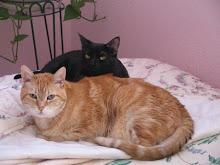 |
Elina Makropulos lives 300 years beyond her normal life expectancy because the Hapsburg Emperor Rudolf II forced her alchemist father to administer to her the "elixir of life" that he had discovered. Throughout her very long life, she assumes a number of identities, always as a singer with the initials E.M. As Emilia Marty, her final identity, she discovers the supreme value of Death in giving meaning to Life. (For more details, check the synopsis at the site of the link above.)
This story line gives rise to the obvious question: Would you want such an extended life?
I find myself at cross currents with this.
Eventually, all the people about whom I care would die. At the level of great-great-great grandchildren (and there might be hundreds of these), the bond of progeny would probably diminish to the point of meaninglessness (as it did for E.M.)
But, there would be so many books that I'd like to read for which I now lack the time, so much knowledge to gain - including the knowledge of unfolding events and scientific advances. And the indulgence of my creative spirit; I could even manage to use up all the glass that I so greedily purchased when it was on sale for 50% of its usual cost.
But without people for whom I care a great deal, without that human connection, none of this would matter. I wouldn't care about the books or knowledge. My creative spirit would whither.
But, if I could maintain a connection with something larger than myself, with Nature most likely, that would be sufficient to give meaning to my life. (Were I of a more spiritual bent than is my current inclination, God - or god - would well serve this purpose.) And, if I could maintain this connection to something larger than myself, to Nature, I could care about Nature's critters as I do now. Simply put, as Daisy is important to me now, another cat and cats way way way beyond, might one day be my salvation. And, if I could care about other pussycats, I could care about other humans even knowing how comparatively brief their lives would be. I might no longer have a special attachment to my progeny, but there would be human beings who would become special to me if I opened myself up to caring about them.
An unexpected end point to this reflection is a renewed understanding about how important important human connections are to me. The repeated use of "important" is intentional. I do not need a large number of human connections. I need important human connections. Without them - and without one sweet pussycat - all else in my life becomes meaningless.
The connection to something larger than myself is of less importance to me with the prospect of death nipping at my heals than it would be with a much larger life horizon. Even so, I would be well advised (by myself) to better nurture my connection with the Nature that is so readily available to me. Interestingly (to me) the thoughts that I expressed beginning with the paragraph with the picture of Daisy came upon me as I was working out on my elliptical cross trainer and looking out the window at the trees and the sky.
(unrelated p.s.: There's a nice photo of me an another woman from the Autumnal Gathering here.)





























